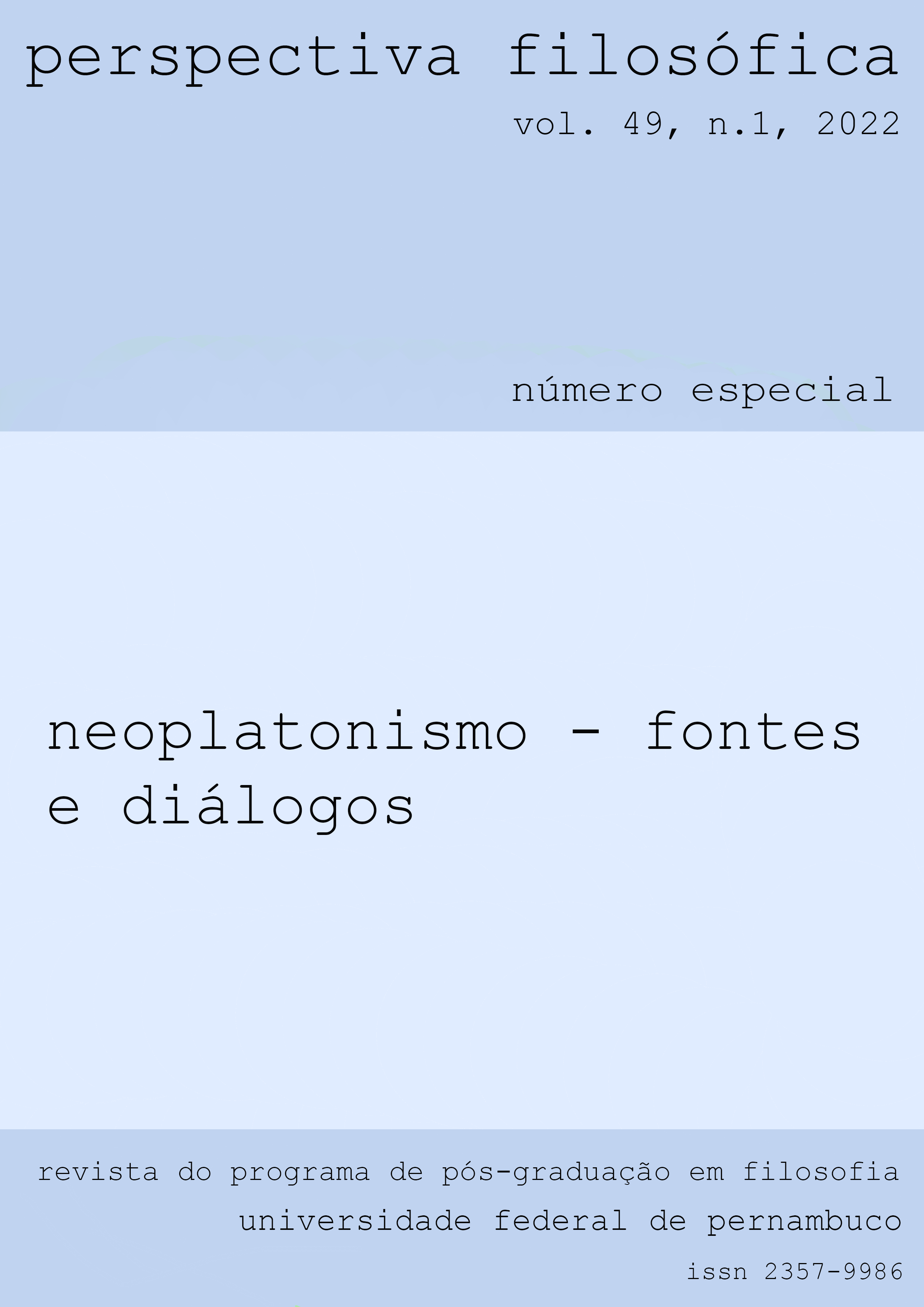Metriopátheia kaì apátheia in later Neoplatonism: Olympiodorus of Alexandria
DOI:
https://doi.org/10.51359/2357-9986.2022.253145Keywords:
alexadrin neoplatonism.virtues.aristotelism.stoicismAbstract
The conserved readings of Olympidorus on some dialogues of Plato imply an audience with limited philosophical experience as opposed to those carried out by Proclus, and even Damascius. However, such readings reveal an acute sensitivity to the ethical issues of the early Platonic dialogues and their dramatic context. It is commonly recognized that the Neoplatonic school of Alexandria, compared to the school of Athens, gives more room to Aristotelianism in its elaboration of some philosophical doctrines. In this sense, the present work tries to investigate such consideration in one of his conserved works, On Plato First Alcibiades. By discussing the skopós of the dialogue and the reading of Proclus and Damascius, Olympiodorus seems to give rise to more than one skopós: political as well as cathartic and contemplative. All this within the framework of the hierarchy of Neoplatonic virtues, in which both the Aristotelian imprint and the Stoic influence are perceived.References
GRIFFIN, M. Olympiodorus: Life of Plato and On Plato First Alcibiades 1-9. London: Bloomsbury, 2015
GRIFFIN, M. Olympiodorus:On Plato First Alcibiades 10-28. London: Bloomsbury, 2016.
WESTERINK, L. G. The Greek Commentaries on Plato’s Phaedo. I Olympiodorus. Wiltshire: The Prometheus Trust, 1976
BRISSON, L. “Le doctrine des degrés des virtues chez les Néoplatoniciennes. Une analyse de la Sentence 32 de Porphyre, de ses antécedénts et de ses conséquences”, Études Platoniciennes 1, 2004
DILLON, John. The Golden Chain. Studies in Development of Platonism and Christianity. VIII: “Metriopatheia and Apatheia: Some Reflections on Controversy in Late Greeks Ethics”. London: Variorum, 1990
DILLON, John-GERSON, Lloyd. Neoplatonic Philosophy. Introductory Readings. Cambridge: Hackett Publishing, 2004
GERSON, L. “The Neoplatonic Interpretation of Platonic Ethics” en MIGLIORI, M-NAPOLITANO VALDITARA, L (eds). Plato Ethicus, Philosophy is Life. Academia Verlag: Sankt Augustin, 2004
GRIFFIN, M. “Olympiodorus of Alexandria” en TARRANT, H-LAYNE, DBALTZLY, J and RENAUD, F. Brill’s Companion to the Reception of Plato in Antiquity. Brill: Leiden, 2018
GRIFFIN, M. “Olympiodorus of Alexandria” en TARRANT, H-LAYNE, DBALTZLY, J and RENAUD, F. Brill’s Companion to the Reception of Plato in Antiquity. Brill: Leiden, 2018
HADOT, I. Le probléme du néoplatonisme alexandrin, Hiérocles et Simplicius. Paris: EA, 1978
RENAUD, F-HARRANT, H. The Platonic Alcibiades I. The Dialogue and its Ancient Reception. Cambridge: CUP, 2015
RENAUD, F. “Tradition et critique: lecture jumelée de Platon et Aristote chez Olympiodore”, Laval thélogique et philosophique Volume 64 (1), 2008, pp.89-104
SAFFREY, H D-SEGONDS, A. Marinus. Proclus ou sur le Bonheur. Texte établi, traduit et annoté. Paris: Les Belles Lettres, 2001
TARRANT, H. “Olympiodorus and Proclus on the Climax of the Alcibiades”, The International Journal of Platonic Tradition 1 (2007)
TARRANT, H. “Olympiodorus and the Surrender of Paganism”, Byzantische Forschungen 24,1997
Downloads
Published
Issue
Section
License
A Revista Perspectiva Filosófica orienta seus procedimentos de gestão de artigos conforme as diretrizes básicas formuladas pelo Conselho Nacional de Desenvolvimento Científico e Tecnológico (CNPq). http://www.cnpq.br/web/guest/diretrizesAutores que publicam nesta revista concordam com os seguintes termos:
Os autores mantém os direitos autorais e concedem à revista o direito de primeira publicação, sendo o trabalho simultaneamente licenciado sob https://creativecommons.org/licenses/by/4.0/deed.pt_BR que permite o compartilhamento do trabalho com reconhecimento da autoria e publicação inicial nesta revista.
Os autores têm autorização para assumir contratos adicionais separadamente, para distribuição não-exclusiva da versão do trabalho publicada nesta revista, com reconhecimento de autoria e publicação inicial nesta revista (Consultar http://opcit.eprints.org/oacitation-biblio.html).

Esta revista está licenciada com uma Licença Creative Commons Atribuição 4.0 Internacional.













